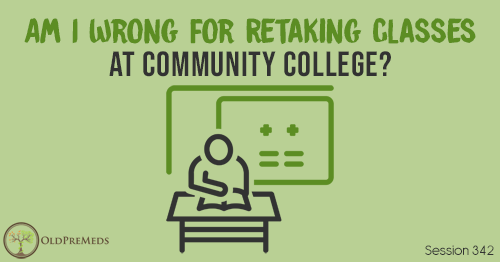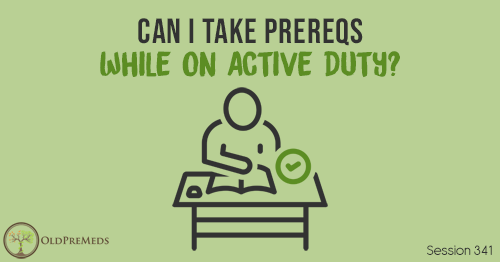Apple Podcasts | Google Podcasts
Session 49
In this week’s episode, Ryan gives his take on whether you should do a masters program prior to taking a postbac program and he also sheds some light to the confusion around undergrad, postbac, and graduate GPAs.
If you haven’t yet, register at OldPreMeds.org so you can post your first question right here on the podcast.
OldPreMeds Question of the Week:
The poster is a true nontraditional student who didn’t want to go to medicine until after graduating college. They decided to pursue a medical career after graduating from a public university with very good standing but didn’t do so well with their freshmen and junior year where and ended up graduating with a 2.8 GPA with English, Sociology, Psychology, and Calc1 prereq in 2015. Since then, they’ve been working full time and part time. Now she has decided to pursue medicine, got her CPR card, and looking into applying to postbac programs but not sure whether they have the academic potential to apply to postbac programs.
Some have said that instead of going straight to a postbac premed program, they should instead get their master’s degree and along with good postbac GPA overall, they should then apply to a postbac premed program, then medical school.
Do you need to do a Masters to get into a postbac program?
Here are the insights from Ryan:
On your applications, your GPA is broken down in a couple different ways:
- Undergrad GPA
- Postbac GPA – while listed separately, is counted as an undergrad GPA
- Graduate GPA
If you get a Master’s GPA, that’s only affecting your graduate GPA, and not your postbac GPA or your undergrad GPA.
A postbac doesn’t necessarily have to be a postbac-specific program, but any undergrad classes that you were taking after you get your degree.
Ryan recommends:
Unless you really want a masters in whatever you’re planning on studying, a masters degree for the sake of boosting your GPA for medical schools or postbac programs is a waste of time.
This poster’s GPA might not be competitive enough for formal postbac programs so he/she will have to look around and use the AAMC postbac database and look for the Career Changer Postbac Programs and reach out to them.
Here are your possible options:
- You can take the prereqs as a non degree-seeking undergrad student (so this would be a DIY postbac and this would be your postbac GPA) at a four-year university
- The only differences between a formal postbac and a do-it-yourself postbac are the level of support and the cost.
- Formal postbacs are more expensive because they are like mini-universities within a university which have separate advising setup specifically for postbac programs (Also included are shadowing experiences, clinical experiences. MCAT prep, etc.)
- However, there is no difference between getting 4.0 in a formal postbac and getting a 4.0 in a DIY postbac program as a non degree seeking student on your applications. Either of both will be your postbac GPA which will be factored into your undergrad GPA.
Major takeaway from this episode:
Do well as a non degree seeking student. Do well in a formal postbac. But the master’s degree is a waste of time.
Links and Other Resources:
AAMC postbac database – Career Changer Postbac Programs
Transcript
Introduction
Dr. Ryan Gray: The Old Premeds Podcast, session number 49.
You’re a nontraditional student entering the medical field on your terms. You may have had some hiccups along the way, but now you’re now ready to change course and go back and serve others as a physician. This podcast is here to help answer your questions and help educate you on your nontraditional journey to becoming a physician.
Now welcome to the Old Premeds Podcast if this is your first time joining me, or us. This is the podcast for you, the nontraditional premed student. But don’t worry if you’re a traditional premed student, a lot of what we talk about is still relevant to you. Today’s question, again directly from the forums over at www.OldPremeds.org is a true postbac student. Not a true postbac student, a true nontraditional student, and a student who didn’t want to go into medicine until after she had graduated from college already. Let’s talk about everything that he or she is doing.
Postbacs and Master’s Degree
It says, ‘Like so many here I decided to pursue a medical career after I graduated. I graduated from a public university with a very good standing, however I didn’t do so well with my freshman and junior year, and ended up graduating with a 2.8 GPA, with English, sociology, psychology and Calc 1 pre-req’s for medical school to show for it. That was a year ago in 2015 and since then I’ve been working full time and part time.’ Now they have decided to pursue medicine, and I will kind of paraphrase the rest. They got their CPR card, and are looking into applying to postbac programs, but they’re not sure that they have the academic potential to apply to postbac programs. Says, ‘I want to try applying however in hopes that I can get a chance at any one of the good programs. However I’ve been talking to people and some have said that instead of going straight to a postbac premed program, I should instead go and get my Master’s, and once I have a degree plus a good postbac GPA to use, I should then apply to a postbac premed program, and from there medical school. I have weighed out the pros and cons to doing such a plan, and here’s what I have. The pros: I have a Master’s or PhD, great potential there. I have a good academic standing, thus making me more competitive for applying to postbac programs. I intend on pursuing a Master’s or PhD in sociology or social work and get some research experience. Cons: paying for another degree, plus postbac, plus medical school is going to weigh heavy on the wallet. But there are loan forgiveness programs, fingers crossed they stick around or get better, and/or a loan repayment program, or I will win the lottery. I want to be in school for the fall 2017 term full time. Currently dedicating 2016-2017 to volunteering, and will take the GRE sometime in December. The only other option I’ve thought of is to take all the pre-req’s as a non-degree student at a four year university, but I’m not sure if that will give me a competitive postgrad GPA.’
Alright so one thing in here that I wanted to clarify, this student posted, ‘I should instead go and get my Master’s and once I have a degree plus a good postbac GPA to use, I should then apply to a postbac premed program.’ I wasn’t quite sure what he or she meant by that statement. It sounded like they were saying that the Master’s was going to be a postbac GPA. Just remember on your applications, your GPA is broken down a couple different ways. You have your undergraduate GPA, your postbac GPA, and your graduate GPA. And your postbac GPA, while it’s listed separately, is counted as an undergrad GPA. So if you get a Master’s GPA, that’s not affecting a postbac GPA, and it’s not affecting your undergrad GPA, it’s only affecting your graduate GPA. A postbac, and it doesn’t have to necessarily be a postbac specific program, a postbac is any undergrad classes that you are taking after you get your degree. So just that clarification there.
So here’s my recommendations. A Master’s degree, unless you really want a Master’s in whatever you’re planning on studying, and this person talked about sociology or social work, unless you really want that education and that experience, a Master’s degree for the sake of boosting your GPA for medical schools and/or for postbac programs is a waste of time. For this student, their GPA might not be competitive enough for formal postbac programs and he or she will have to look around and use the AAMC postbac database and look for the career changer postbac programs and reach out to them, and talk to them and say, ‘Here’s where I’m at. Can I apply or not? Am I competitive enough or not to apply?’
Recommendations Regarding Postbacs
Here’s what I would do in this situation. I would take- and this student said it at the end, I would take the pre-req’s as a non-degree seeking undergrad student. Now this student said, ‘I’m not sure if that will give me a competitive postgrad GPA.’ So again, there’s a lot of mixing up of postgrad GPA, and postbac GPA. As a non-degree seeking student, those are postbac classes so that will be your postbac GPA. The only difference between a formal postbac and a do-it-yourself postbac, which would- that’s what this would be as a non-degree seeking student taking the pre-req’s, the only difference typically is the level of support and the cost. Formal postbac programs are going to be expensive because they are kind of mini universities inside of a university dedicated to helping students like a career changer. And so they have the advising set up typically, and the professors set up sometimes separate and specifically for postbac programs, and so they’re sustaining themselves by charging lots of money. And some students need that, and built into that usually is some shadowing experiences, some clinical experiences, preparation for the MCAT usually is included in that. So there are some benefits for a formal postbac program, but there’s no difference between getting a 4.0 in a formal postbac program, and getting a 4.0 in a do-it-yourself postbac program as a non-degree seeking student, there’s no difference in how that GPA looks on your applications. It’ll all be postbac GPA and will factor into your undergrad GPA.
So if I were this student, I would- depending on my need for structure, I would go and take the pre-req’s as a non-degree seeking student at a four year university. It’ll be a lot cheaper, and it all works out the same. You’ll have to take the MCAT prep courses on your own if you plan on taking a prep course. You can obviously study for the MCAT on your own, and really there’s no difference in how ‘competitive’ your GPA will be. Do well as a non-degree seeking student, do well in a formal postbac, but the Master’s degree is a waste of time.
Final Thoughts
Alright I hope that helped and helped clarify some thoughts for you, and helped you add to your pros and cons list. If you have a question that you want answered here on this podcast, go to www.OldPremeds.org, register for an account, it’s quick and easy, and you’ll be on your way. This student- this was his or her first post asking this question, so you can have your first post answered here on the podcast as well.
As we’re releasing this, I hope you have a Happy Thanksgiving here in the US. It is the end of November, we’re all getting ready to sit down and eat some turkey and whatever else. I am a vegan so I haven’t figured out what I’m eating yet, but it won’t be turkey. But I hope you have a great time, safe travels if you are travelling, keep motivated on your path as a nontraditional student. Everything that you’re doing every day, all the hard work that you’re putting in is paying off and will pay off once you put on that white coat. Just picture yourself in that white coat, it makes it all the more worth it. I hope you have a great week and we’ll see you next week here at the Old Premeds Podcast.












